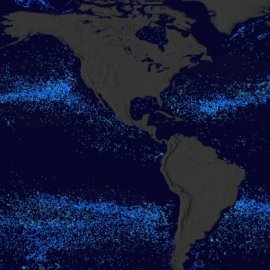Waste
-
English
-
ListenPause
[intro music, ocean sounds]
Welcome to World Ocean Radio…
I’m Peter Neill, Founder of the World Ocean Observatory.
We measure value in our society mostly by profit, and profit is mostly derived from agriculture and manufacture, the twin supports of the capitalist system that feeds on consumption, often unrestrained and unregulated, that has brought us to a crisis of supply and demand, loss overtaking profit, for many worldwide to the advantage of very few.The biggest by-product of consumption is waste, heretofore omitted as a meaningful entry on the balance sheet and the calculation of individual and gross national product. There are obvious forms of waste, although the extent of these may not be fully understood by consumers. Wasted food, for example, the tons of vegetable matter discarded in the process of growth, harvest, packaging, distribution, preparation, and service.
In a very instructive book, Ecology and Socialism, published by Haymarket Books, the author Chris Williams writes, “Waste is not an accident; it is built into the structure of capitalism.” The result may be ample food on your table, but not on everyone’s, indeed he goes on to cite that “in a world where almost one in every seven people goes hungry, including almost forty million in the richest country on the planet, easily the most despicable aspect of this waste is within the industrialized food industry.
In the United States, the amount of food thrown away by supermarkets, restaurants, convenience stores, and consumers…is enough to feed all one billion malnourished people twice over.”
Waste come in many forms: water polluted, land poisoned, soil depleted, energy lost in inefficiency and emissions, and overall habitat destruction that removes the production of that fecund natural resource from future value and reward.Planned obsolescence is a hidden form of waste: the deliberate design for failure built into a product with the covert intent to force a new design to be built as further consumption the original value discarded. Even recycling, touted as counter-consumption, sustains waste, often by the cost of its transportation and treatment, by associated pollution in its disposal, and often by the cost of exporting it to places far away and out of sight where it remains an ineffable, forgettable negative.
And then there is psychological waste, the by-product of circumstance affected by physical and social detritus associated with a world built on affluence that differentiates between individuals, labor, race, nation, and quality of life.
We speak often of the uncertainties of that life: health, employment, unequal social services, and education, presumably supported by profit, but too often not, resulting in inequity, injustice, conflict, and war. And, of course, war is the most wasteful thing of all.
If the terrestrial supply approaches the limits of demand, where do we turn? Chris Williams quotes Marx use of the phrase “metabolic rift” as the outcome of the separation between us and the earth created by capitalism and consumption. He defines metabolic as, “the sum of the physical and chemical processes in an organism by which its material substance is produced, maintained, and transformed, and by which energy is made available.” It is the essential system for successful living in every instance.
The ocean is what remains. While under stress by the same forces, it nonetheless contains the necessary supply, of source and resource—if sustained—for rescue from irredeemable waste. It provides access to water, energy, food, health, and opportunity for survival. It provides connection, community, and continuity in a world increasingly disconnected, alienated, and fragmented.
If we waste it, there is nothing left.
Waste not, want not.
Here is a line from T.S. Elliot’s poem The Waste Land:
I sat upon the shore
Fishing, with the arid plain behind me
Shall I at least set my lands in order?We will discuss these issues, and more, in future editions of World Ocean Radio.
WORLD OCEAN RADIO IS DISTRIBUTED BY THE PUBLIC RADIO EXCHANGE AND THE PACIFICA NETWORK, FOR USE BY COLLEGE AND COMMUNITY RADIO STATIONS WORLDWIDE. FIND US WHEREVER YOU LISTEN TO PODCASTS, AND AT WORLD OCEAN OBSERVATORY DOT ORG, WHERE THE FULL CATALOG OF MORE THAN 760 EPISODES IS SEARCHABLE BY THEME.
[outro music, ocean sounds]
Source material from this episode:
Ecology and Socialism: Solutions to Capitalist Ecological Crisis
by Chris Williams
Haymarket Books, 2010
Paperback ISBN: 9781608460915
EBook ISBN: 9781608460922
https://www.haymarketbooks.org/books/342-ecology-and-socialismThe most substantial by-product of human consumption is waste, thus far omitted on balance sheets and in calculation of individual and gross national product. Waste comes in many forms: polluted water, poisoned land, energy lost, habitat destroyed, industrial waste, food discarded, planned obsolescence, even recycling. What remains? The ocean. While under stress by the same forces, it contains the necessary supply of source and resource if we have the courage to sustain it.
About World Ocean Radio
World Ocean Radio is a weekly series of five-minute audio essays available for syndicated use at no cost by college and community radio stations worldwide. Peter Neill, Founder of the World Ocean Observatory and host of World Ocean Radio, provides coverage of a broad spectrum of ocean issues from science and education to advocacy and exemplary projects.
World Ocean Radio
15 Years, 760+ Episodes
Ocean is climate
Climate is ocean
The sea connects all things
- Login to post comments



